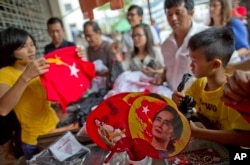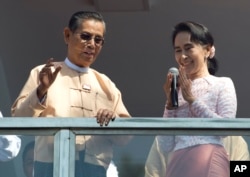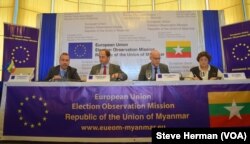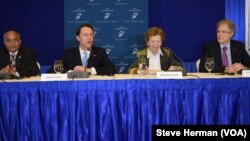Myanmar's National League for Democracy accused the Union Election Commission Tuesday of intentionally delaying the release of parliamentary election results, which so far have shown the opposition party with a vast lead over the military-backed ruling Union Solidarity Development Party.
"It doesn't make sense that they are releasing the results piece by piece. It shouldn't be like that," NLD spokesman Win Tien said after party leaders met at the home of Aung San Suu Kyi. "They are trying to be crooked."
More than 30 million people cast votes in Sunday’s election, the first nationally competitive elections in a quarter-century after decades of military rule in Myanmar, which was formerly known as Burma.
Official results released by the Union Election Commission show the opposition NLD so far has won 107 seats in the lower house of parliament, while the military-backed ruling USDP has won just seven.
The NLD has already claimed a landslide victory. In an interview with the BBC Tuesday, Aung San Suu Kyi said her party has won about 75 percent of all contested seats.
Myanmar political experts said the NLD needs to capture at least two-thirds of the parliamentary seats to overcome the military’s veto in the bicameral legislature, known as the Pyidaungsu Hluttaw, which selects the president.
'Anti-Muslim' sentiment
U.S. observer Jason Carter told reporters the election was marked by “anti-Muslim sentiment.” He led a group of international observers in Myanmar on behalf of the Carter Center, founded by his grandfather, former President Jimmy Carter.
Disenfranchisement of Muslims and other minorities did not bother many Myanmar citizens, such as Buddhist monk Dahmma Par La.
“All could participate under the election commission’s rules. Every citizen holding a national ID card could vote if their name was on the rolls. But those who didn’t have the card were not eligible to vote," he told VOA near Yangon's famous Shwedagon Pagoda.
One of the most high-profile international observers of the election, Ireland's former President Mary Robinson, told VOA she could not charfacterize the election as free and fair, due to the disenfranchisement of some minorities.
“And I wouldn’t tend to use that expression anyway if you’ve got 25 percent of both houses [of parliament reserved for] the military, problems with the constitution, people excluded because they’re Muslim or the Rohingya. And also because they’re in situations of conflict,” said Robinson, who observed Sunday's balloting as part of the Carter Center team.
She praised the high turnout of voters -- estimated at 80 percent -- as something that would be the envy of many advanced democracies, and said that caused some foreign observers in the country literally to shed tears of joy.
Election process 'encouraging'
"The fact that losing USDP candidates are accepting defeat is encouraging for process credibility," Alexander Graf Lambsdorff, head of the European Union’s election observers, told reporters in Yangon Tuesday.
“I think [the election] was a success because we could choose the leadership we wanted - Aung San Suu Kyi and the National League for Democracy," first-time voter Khin Zar Chi Aung, 22, a university student, told VOA.
This was Mayanmar's first election since the military junta established a nominally civilian government in 2011, after nearly 50 years in power, and one year after Aung San Suu Kyi was freed from house arrest and a ban on her NLD party was lifted.
The opposition party led by Aung San Suu Kyi swept to a landslide victory in a previous election in 1990, but was prevented by the junta from taking power.
She was placed under house arrest for much of the next 20 years, and constitutionally barred from becoming president even if her party is victorious again this time. The military junta placed a clause in the constitution in 2008 barring anyone with a foreign spouse or children from the presidency. The Nobel peace laureate's late husband was British, as are her two children.
Aung San Suu Kyi has brushed off the constitutional impediment, saying that "won't stop me from making all the decisions as the leader of the winning party."




